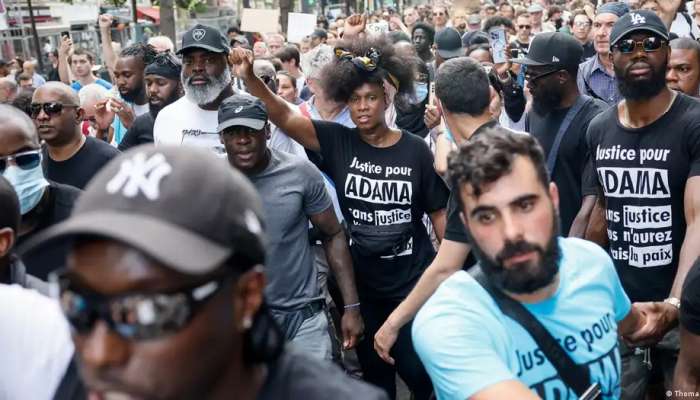
Paris: More than 2,000 people gathered in central Paris for a memorial rally on Saturday despite a court ban.
The march commemorates the 2016 death of Adama Traore, a Black man, in police custody.
Marches took place throughout France to denounce police brutality and racial profiling, as tensions run high after days of rioting engulfed the country.
Around 5,900 people took to the streets around the country, the French Interior Ministry said.
France has been grappling with unrest sparked by the police killing of a 17-year-old of Algerian origin at a traffic stop on June 27.
Meanwhile, France's Foreign Ministry rejected accusations of structural racism made by the UN Committee on the Elimination of Racial Discrimination (CERD).
Sister, lawmakers condemn ban
A court had ruled that the chance of unrest was too high to allow Saturday's march in the French capital to go ahead.
On Twitter, Traore's older sister, Assa, criticised the decision.
"The government has decided to add fuel to the fire (and) not to respect the death of my little brother," she said.
She said she attended the rally on Saturday afternoon to tell "the whole world that our dead have the right to exist, even in death."
"They authorize marches by neo-Nazis but they don't allow us to march. France cannot give us moral lessons. Its police is racist and violent," she said.
Police said that a legal case had been opened against Assa Traore for organising the event.
Among those present at the banned march were lawmaker Jean-Luc Melenchon, of the left-wing Unbowed party, and Sandrine Rousseau, of the EELV Green Party.
"Public liberties are losing ground little by little," Rousseau said.
"From prohibition to repression ... the leader is taking France to a regime we have already seen. Danger. Danger," Melenchon tweeted.
Foreign Ministry rejects UN racism allegations
The Foreign Ministry responded to accusations of structural racism in France's police force force made by CERD.
CERD issued a statement on Friday on the situation in France in which it denounced excessive force and racial profiling used by police.
"Any measures of ethnic profiling by the forces of law and order are prohibited in France as they violate the constitutional principle of equality," the ministry said.
Responding to reports that French police had wielded excessive force, the ministry said that the use of force by law enforcement is "subject to the principles of absolute necessity and proportionality and is strictly monitored and controlled."